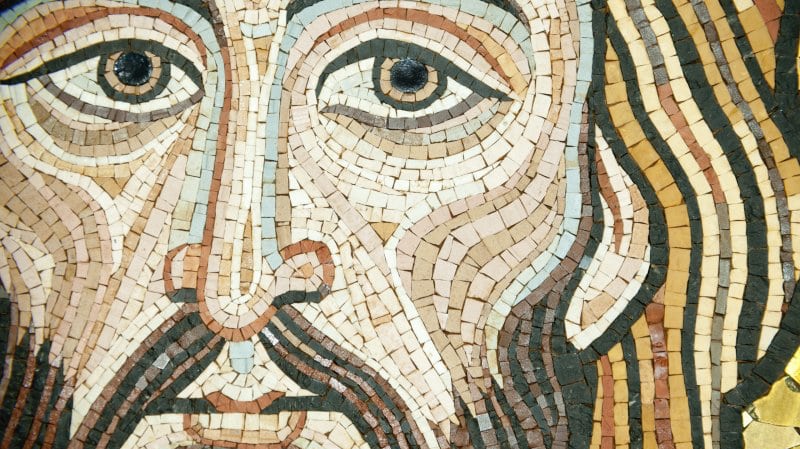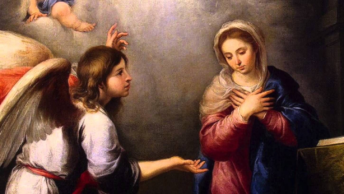Even limiting our consideration to what the Church offered us the past couple of weeks from the Gospel of John, we can feel left suspended in midair, rather puzzled and with still several pressing question marks.
Is Jesus the gate of the sheepfold or the Good Shepherd or both? Who is the Good Shepherd: Jesus or the Father who entrusted his sheep to his Son Jesus for safekeeping? Is Jesus the gate of the sheepfold or the way to the Father? How can Jesus be doing the will of the Father and be one with the Father at the same time? How can Jesus be in the Father and be about to go back to the Father? And here is perhaps the biggest question mark left unanswered: how is it possible that if we believe in Jesus we, mere mortals, would be capable of doing works bigger than those done by him? (John 14: 12) Let me attempt to put forth some thoughts designed at least to reduce the size of those question marks.
The evangelist John has been compared to a soaring eagle lifting us to unfamiliar heights where even genuine saints would find themselves trembling and gasping. His gospel must be the masterpiece of all masterpieces of the Holy Spirit. What is proclaimed to us in it is, concisely, God’s endless act of power and love that scoops us up from the lowliness of our flesh to make us sharers in the fullness of divine life. God becomes flesh so that we can take our place within the Holy Trinity.
In the book Heightened Consciousness by David Granfield there is a phrase that, in my opinion, encapsulates the whole gospel of John: “…the spirit comprises all human realities, body and soul, open to the Spirit of God; the flesh, the same realities closed to the Spirit of God.”
It also sheds light on what Jesus (God in human flesh) tells us: “And if I go and prepare a place for you, I will come back again and take you to myself, so that where I am you also may be.” (John 14:3) Overlooked is the fact that, while the preparation of our minds and hearts progresses upwardly from the lowest level of the flesh, the place meant for each one of us within the Holy Trinity has already been readied from the foundation of the world. (see Matthew 25: 34)
At the lowest possible level, the realm of the flesh, we allow ourselves to be ruled by animalistic instincts for mere survival and habitually resort to aggression.
At the next level up we are intent on working and toiling for food, shelter, clothing and other basic necessities of life for ourselves and those closest to us.
After that, we begin to value cooperation, interaction, civility and social responsibilities.
Moving up one more step, we discover nobility in our soul and we are willing to give up some of what we have; we learn to share and be in solidarity with the less fortunate.
Many of us might think that to stop at that stage is already all that can be reasonably expected of human beings. However, especially we, influenced by the Judeo-Christian milieu, might go up one more step to the level of religion to provide answers to the most fundamental and existential questions that surface now and then and clamor for satisfying answers.
However, incredible as it might sound, the level of religion is the most insidious and perilous one because those who settle in it are convinced of being swept up by the whirlwind of the Holy Spirit while, in reality, they are still ruled by the flesh. Although Jesus used this figure of speech, they [the Pharisees] did not realize what he was trying to tell them. (John 10:6)
Religion is the human attempt at finding or creating a god over whom we can hold sway and who is ready to grant us all the favors that we expect on account of the merits of our good conduct and seemingly impeccable performance. The Gospel of John is filled with confrontations between Jesus and those on this, the level of religion. He refers to them either as “Jews” or “Pharisees.” Only those who heed the voice of Jesus and follow him trustingly, who “believe in him” to the point of keeping and living by all his words are swept up by his Spirit onto the final plateau, into the Holy Trinity where their place has been readied. For them Jesus is the only Way to the Father; the only Truth that enlightens their steps; the only source of Life. Their hearts alone are not troubled because the Holy Spirit is their divine Advocate and Comforter.
- Only they are driven by the Spirit to carry out joyfully Jesus’ New Commandment of loving each other as he has loved them (John 13: 34).
- Only they feel fully comfortable living in Christ as contrasting statements such as those that I mentioned before dissolve away in the light of the Spirit.
- Only they are capable of the greater works of silent self-immolation, generous self-giving, joyous service of the least of their brothers and sisters because they live already, as much as it is humanly possible, within the Holy Trinity.
- Only they find compelling reasons to be always thankful to the Father.
- Only they already taste some of the joys of heaven no matter the weight of the cross they bear.
It is how the cross is borne that separates those comforted and sustained by the Spirit from those still affected by their flesh. The latter are enveloped in darkness and despair and seek actively to end their life; the former endure the cross with courage and serenity because they are given already some of the consolations that are enjoyed within the Holy Trinity.
Today Jesus repeats his compassionate order: “Do not let your hearts be troubled…”
That love-filled order is for all of us who are still ruled by the flesh to various degrees of force. It is for us especially on this Mother’s Day. I am rather sure that our mothers, driven by the Spirit of joyous self-sacrifice, are already enjoying at least some of the consolations that are “standard” in the place prepared for them within the Holy Trinity. May they be our inspiration so that, soon, our hearts, too, may find lasting serenity and joy.








